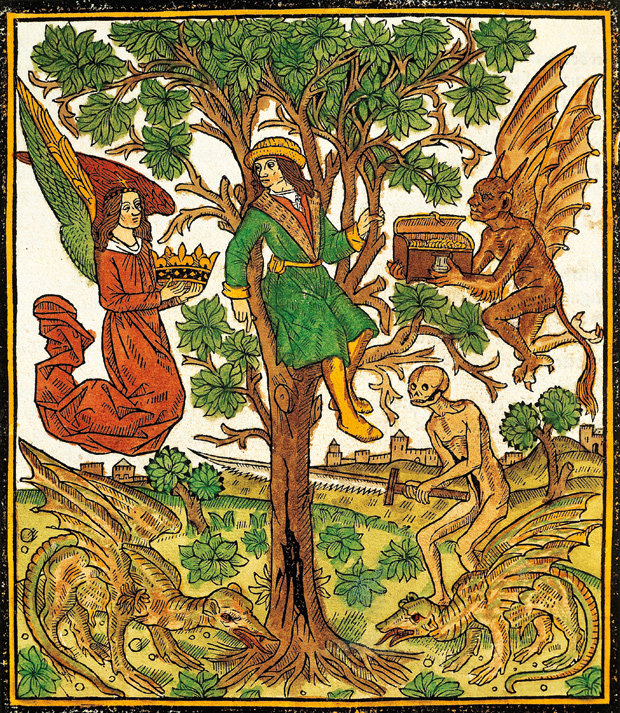If there is one underlying source from which all our other societal problems stem, it is surely this: we no longer know who we are or how we got here. Worse, we mistakenly believe our situation to be inevitable, presuming that we have arrived in this modern liberal state through something like gravity.
At the very opening of Inventing the Individual Larry Siedentop lays this problem out. People who live in the nations once described as Christendom ‘seem to have lost their moral bearings’, he writes:
We no longer have a persuasive story to tell ourselves about our origins and development. There is little narrative sweep in our view of things. For better or worse, things have just happened to us.
The problems this leads to are exacerbated by the fact that ‘we are in a competition of beliefs, whether we like it or not’. And so this extraordinarily wide-ranging, scholarly and beautifully written work sets out to answer one particular question: ‘Is it mere coincidence that liberal secularism developed in the Christian West?’
Beginning with a panorama of the Greek and Roman world, Siedentop goes on to excavate in terrain which may have been taken for granted only a generation ago, but which has currently become controversial. He points out that a major source of the modern conception of liberalism comes from Christianity.
He explains the melding of the traditions — the Greek and Roman with the teachings of Christ and St Paul — and then leads the reader through a tour of the succeeding millennia with a learning which is itself almost miraculous. Taking us through the changing sense of time, he then guides us through Tertullian on freedom (‘One mighty deed alone was sufficient for our God — to bring freedom to the human person’), Augustine, Gregory of Nyssa, Charlemagne and onward.
Along the way he gently demonstrates the manner in which charity — a virtue which can hardly be divorced from the Christian tradition — found its way from a theological idea into a common state of mind and expected action. Elsewhere the way in which Christianity helped shift the concept of the governed — or even ‘owned’ — people into ‘souls’ is filled with insight. As is the explanation of how the concept of the equality of sexes — hardly shared by all currently competing beliefs — developed from a revolutionary idea into something now so entirely absorbed that whole careers can be wrecked by being foolish enough even to question its edges.
It seems that Siedentop knows that the unfashionable facts and history he relates may win him certain detractors. About half way through the book he writes, on the subject of Christianity’s role in the very slow eradication of slavery, that ‘to emphasise the role of the church will immediately raise hackles’. He rightly refers to the exorbitant claims in this regard made for and by the church in the past and deals with them. But he also points out that the reaction to such claims — found in particular in Karl Marx and his followers — which subscribes such events to ‘a materialism that rules out beliefs as effective causes’ is not only just as wrong, but perhaps even more wrong.
This kind of intellectual history is exceedingly hard to write. Unlike the history of an individual or even an empire, it can barely be prevented from spilling in every direction. In unpractised hands this makes such history impossible to contain and the results impossible to read. Even successful examples must, by necessity, miss out certain strains of a tradition, focus on certain figures and neglect others. Along the way anybody who makes a specialism of any tiny portion of the vast canvas will find room to quibble. But it seems to me that in this work, and in his highly practised hands, Siedentop has achieved something quite extraordinary. In this learned,subtle, enjoyable and digestible work he has offered back to us a proper version of ourselves. He has explained us to ourselves.
In his closing pages he notes that the forgetfulness, ignorance and sometimes even hatred of our past with which the West is now afflicted is already having severe effects. In America he sees a growing evangelical tradition which is ignorant of the vital hand-in-hand tradition of western secular liberalism. Meanwhile, in Europe there exists a strain of thought which will give no credit whatsoever to the religious tradition from which we come. It is, he rightly says, ‘a strange and disturbing moment in western history.’
At the very end Siedentop asks, ‘If we in the West do not understand the moral depth of our own tradition, how can we hope to shape the conversation of mankind?’ Indeed. All that need be said is that there can be few better ways to understand that depth of tradition, or feel appropriate gratitude for it, than to read this magisterial, timeless yet timely work.







Comments